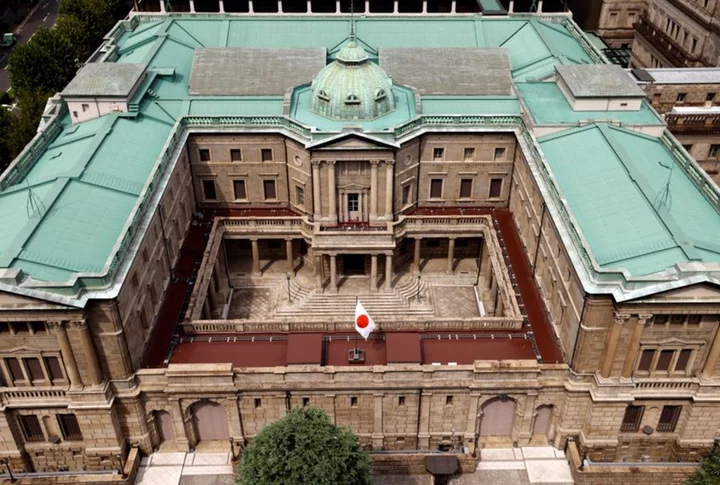By Leika Kihara
TOKYO The Bank of Japan is expected to keep policy unchanged on Friday but will likely consider if tweaks to ultra-loose monetary settings need to be made as bond yields rise and inflationary pressures persist.
Markets are focusing on comments from Governor Kazuo Ueda's briefing, to be held after the bank's two-day policy meeting, for clues on how soon the bank could phase out the massive stimulus programme of his predecessor.
All economists surveyed in a Reuters poll expect the central bank to maintain its short-term interest rate target of -0.1% and that for the 10-year bond yield around 0%.
Many analysts also expect the BOJ to make no changes to an allowance band of 50 basis point set either side of the yield target, as well as a new hard cap of 1.0% adopted in July.
Any such decision would contrast with those of U.S. and European central banks, which in recent meetings have signalled their resolve to keep borrowing costs high to rein in inflation.
But with inflation exceeding the BOJ's target and the yen renewing its slide, markets are focusing on any signals Ueda could drop on the timing of a policy shift.
Data released earlier on Friday showed Japan's core inflation hit 3.1% in August, staying above the central bank's 2% target for a 17th straight month in a sign of broadening price pressure in the world's third-largest economy.
In a move seen by markets as a step toward an exit, the BOJ in July loosened its grip on long-term interest rates to allow them to rise more freely, a nod to increasing inflation.
Ueda told a recent interview the BOJ could have enough data by year-end to determine whether to end negative rates, heightening market expectations of a near-term policy shift.
A Reuters poll for September showed most economists predicting an end to negative interest rates in 2024. Prospects of a rate hike have helped pushed up Japan's 10-year government bond yield to a fresh decade-high on Thursday.
The BOJ faces various challenges in exiting former governor Haruhiko Kuroda's radical stimulus, including weak signs in the global economy and the risk of triggering a spike in yields that boost the cost of funding Japan's huge public debt.
BOJ officials, including Ueda, have also stressed the need to keep easy policy until they are convinced that inflation will stably hit 2% driven by solid consumption and wage growth.
But some analysts see the yen, rather than wage growth or inflation, as the primary trigger for BOJ action.
Growing prospects of longer-for-higher U.S. interest rates have pushed the yen down near the 150-per-dollar level seen as Tokyo's line-in-the-sand for possible currency intervention.
The yen's renewed slide has triggered fresh verbal warnings by government officials, piling pressure on the BOJ to play its part to moderate the pain from rising import costs.
Mari Iwashita, chief market economist at Daiwa Securities, expects the BOJ to tweak its dovish forward guidance in October and end its negative rate policy early next year.
"The BOJ could pull the trigger any time. It really depends on the yen's moves," she said.
(Reporting by Leika Kihara. Editing by Sam Holmes)

